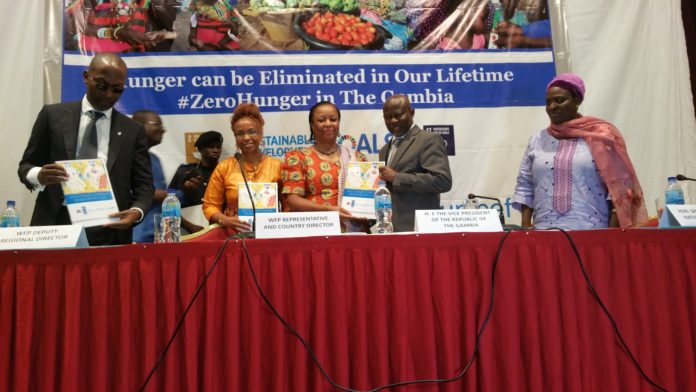By Fatoumatta K Jallow
The Gambia Zero Hunger Strategic Review Report was launched at Kairaba Beach Hotel on Thursday 6th September 2018. The programme is meant to eradicate global hunger, achieve food security and improved nutrition and promote sustainable agriculture by 2030.
Mr A.N.M Ousainou Darboe, the Vice President and Minister for Women’s Affairs in his launching statement, said The Gambia is committed to achieving the SDGs, adding that the revised National Development Plan has provided the opportunity for the realisation of the SDGs particularly SDG 2.
He noted that our generation has a historic opportunity to eradicate global poverty and hunger, address the issue of environmental sustainability, achieve the economic wellbeing of millions of people and ensure that no one is left behind.
Darboe who is also the chair of the Zero Hunger Advisory Board said when people are well-fed they will be healthy and undertake productive activities.
He noted that billions of people across the world suffer from hunger, adding that collectively we have the responsibility in helping to ensure we end hunger, achieve food sustainability, improve nutrition and promote agriculture.
According to him the Gambia has made significant progress in the implementation of the MDGs, including reduction in child maternal and mortality, increase in literacy and gender parity, but was quick to add that the country is still faced with global challenges of poverty, hunger and inequality and global environmental challenges.
He went on to say that The Gambia stands firm to ensure that the recommendations of the review are implemented accordingly.
He pointed out that Government has a vision to achieve food security, improve agricultural productivity as well as attain food self-sufficiency.
He highlighted that Government will take action on the findings and recommendations of the report.
In conclusion he called on partners, the private sector and all stakeholders to continue supporting Government in the fight against hunger.
World Food Programme Representative and Country Director, Wanja Kaaria expressed their readiness to support Government in its derive to achieve SGD2 and also commended Government for its leadership during the review.
Ade Mamonyane Lekoetje, UN Resident Coordinator for her part said ending hunger, achieving food security and improved nutrition, as well as promoting sustainable agriculture are attainable for The Gambia.
She added that sustainable development is simply not possible in the world where nearly one billion people are hungry every day, noting that, ending hunger is not only vital for our peace and security; it is essential for national development and our collective future.
“The zero hunger strategic review present a holistic picture of The Gambia’s food and nutrition security situation today and what must be done in the future, to end hungry and accelerate progress towards the attainment of the sustainable development goals, specifically SDG2, which aims at achieving food security, nutrition and promoting sustainable agriculture, and leaving no one behind”, she highlighted.
The alignment and coordination of many sectors, including health and agriculture, focusing on a clear set of objectives converging into this shared goal is crucial, she also said.
“Specific focus should be given to female–headed households, pensioners, subsistence farmers, children and youth, who are the most vulnerable segment of the population. We must ensure that development does not exclude anyone, especially the most vulnerable .providing these groups with adequate and nutritious food would enable them to lead a productive life”, she concluded.
ZHSR Lead Convener Musa Mbenga in presenting the ZHSR main findings and recommendations we need to create an enabling macro-level environment to promote small-holder farmers through revision of taxes and tariffs that disadvantage local growers; macro-level environment to become conducive to attract investors within the food supply chain; the decentralization policy to be re-visited and operationalized to meet the local context; efforts for gender parity to be increased; the provision social protection support to poor and vulnerable groups such as women and youth to be strengthened; migration and youth employment to be addressed; school feeding programme to be continued and expanded in view of handover to the Government; among others.




















